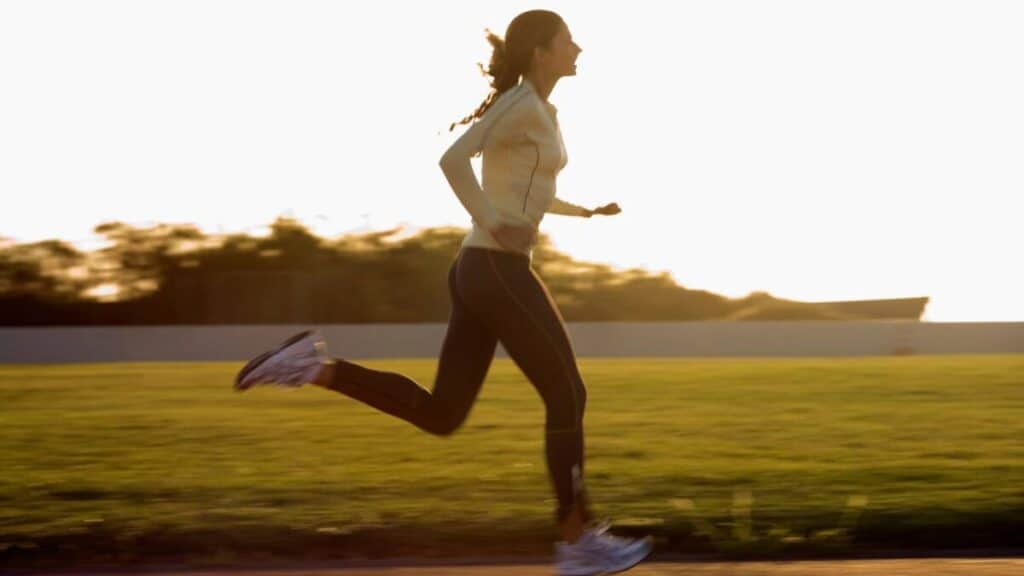If you’re a runner, you know that 10 kilometers is a popular distance to race. Whether you’re a seasoned athlete or just starting out, knowing the average time to run 10 km can be helpful in setting goals and tracking progress. The average time to run 10 km varies depending on a number of factors, including age, gender, and fitness level.
On average, a good 10k time across all ages and genders is 49:43. The fastest 10k time ever recorded s 26:24. For most beginners a good 10 km time is around 1 hour and for more advanced runners its around 35 – 40 minutes.
Table of Contents
Average Time to Run 10 km By Age & Gender
| Average Time to Run 10 km For Males | ||||||
| Age | Beginners | Intermediate | Advanced | |||
| 15-20 | 01:00:10 | 40:10 | 34:00 | |||
| 20-25 | 59:10 | 42:00 | 33:10 | |||
| 25-30 | 59:40 | 39:20 | 34:00 | |||
| 30-35 | 01:00:10 | 39:40 | 34:20 | |||
| 35-40 | 01:00:50 | 39:50 | 35:10 | |||
| 40-45 | 01:05:20 | 42:40 | 38:00 | |||
| 45-50 | 01:07:40 | 43:40 | 39:10 | |||
| 50-55 | 01:10:50 | 49:10 | 40:40 | |||
| 55-60 | 01:14:00 | 51:20 | 45:50 | |||
| 60-65 | 01:20:30 | 54:30 | 48:40 | |||

| Average Time to Run 10 km For Females | ||||||
| Age | Beginners | Intermediate | Advanced | |||
| 15-20 | 01:13:20 | 50:10 | 40:50 | |||
| 20-25 | 01:14:10 | 45:50 | 40:00 | |||
| 25-30 | 01:14:20 | 46:20 | 40:40 | |||
| 30-35 | 01:14:40 | 47:00 | 41:20 | |||
| 35-40 | 01:16:10 | 48:40 | 42:20 | |||
| 40-45 | 01:17:00 | 49:50 | 44:30 | |||
| 45-50 | 01:17:20 | 50:30 | 45:50 | |||
| 50-55 | 01:17:30 | 52:10 | 46:50 | |||
| 55-60 | 01:25:20 | 55:50 | 49:10 | |||
| 60-65 | 01:30:20 | 01:00:10 | 50:30 | |||
Other Running Distances You Might Like
What is an Average Time to Run 10 km?
If you’re wondering what an average time to run 10 km is, you’re not alone. Many runners, both novice and experienced, are curious about what they should aim for when running this distance.
The average time to run 10 km can vary depending on several factors, including age, gender, fitness level, terrain, and weather conditions. However, according to Runner’s World, the average time for men to run a 10 km race is around 56 minutes, while the average time for women is around 1 hour and 4 minutes.
It’s important to note that these times are just averages and that every runner is different. Some runners may be able to complete a 10 km race in under 45 minutes, while others may take over 2 hours. The key is to set a realistic goal based on your current fitness level and work towards improving your time over time.
If you’re just starting out, don’t worry too much about your time. Focus on building up your endurance and gradually increasing your distance. As you become more comfortable running 10 km, you can start to work on improving your speed.
Remember, running is a personal journey, and there’s no one “right” way to do it. The most important thing is to listen to your body, set realistic goals, and enjoy the process.

Factors Affecting Average Time to Run 10 km
When it comes to running a 10 km race, there are several factors that can affect your average time. Understanding these factors can help you improve your performance and achieve your goals. Here are some of the most important factors to consider:
Age and Sex
Age and sex can have a significant impact on your average time to run 10 km. As you get older, your body may not be able to perform at the same level as it did when you were younger. Similarly, men and women have different physiological characteristics that can affect their running performance. On average, men tend to be faster runners than women, although there is a lot of variation within each gender.
Fitness Level
Your fitness level is another important factor that can affect your average time to run 10 km. If you are not in good shape, you may struggle to complete the race at all. On the other hand, if you are in excellent shape, you may be able to run the race at a much faster pace. Improving your fitness level through regular exercise and training can help you achieve faster running times.
Training Program
Your training program can also have a significant impact on your average time to run 10 km. A well-designed training program can help you build endurance, improve your running form, and increase your speed. On the other hand, a poorly designed training program can lead to injury or burnout. It’s important to work with a qualified coach or trainer to develop a training program that is tailored to your needs and goals.
Running Form
Your running form can also affect your average time to run 10 km. Good running form can help you run more efficiently, conserving energy and reducing the risk of injury. On the other hand, poor running form can lead to wasted energy and increased risk of injury. Some common elements of good running form include a relaxed upper body, a slight forward lean, and a midfoot strike.
Rest and Recovery After 10 km
Finally, rest and recovery are crucial factors that can affect your average time to run 10 km. Overtraining or failing to allow your body to recover properly can lead to injury, burnout, and decreased performance. It’s important to incorporate rest days into your training program and to prioritize sleep and nutrition to support your body’s recovery.
By considering these factors and working to optimize them, you can improve your average time to run 10 km and achieve your running goals.

Average 10k Times for Different Groups of Runners
Beginner Runners 10km Time
If you’re a beginner runner, completing a 10k race can be a significant challenge. You may not have a lot of experience running long distances, and you may not have built up the endurance necessary to run a full 10k. On average, beginner runners can complete a 10k race in around 1 hour and 15 minutes to 1 hour and 30 minutes.
To improve your running pace and overall fitness level, it’s essential to focus on factors such as strength training, walking, and recovery. Rest days are also crucial to avoid injury and allow your body to recover fully.
Experienced Runners 10 km Time
Experienced runners have a better understanding of their body and how to train for a 10k race. On average, experienced runners can complete a 10k race in around 45 minutes to 1 hour. To run a faster 10k, it’s essential to focus on endurance, strength training, and tempo runs.
Rest days are also crucial to avoid overtraining and allow your body to recover fully. It’s important to note that the weather, active lifestyle, and finishing time can all affect your average running pace.
Advanced Runners 10 km Time
Advanced runners have a lot of experience running long distances and have built up significant endurance. On average, advanced runners can complete a 10k race in around 35 minutes to 45 minutes. To continue to challenge yourself and improve your energy and strength, it’s essential to focus on running workouts, drills, and interval training.
Casual Runners 10 km Time
Casual runners may not be as focused on running a fast 10k time, but they still enjoy running for exercise and health benefits. On average, casual runners can complete a 10k race in around 1 hour and 30 minutes to 2 hours. It’s important to note that age and sex can also affect your average running pace.
According to RunRepeat, the fastest 10k times are held by runners in Ethiopia and Uganda, with the world record being 26 minutes and 17 seconds. However, it’s important to remember that these times are not typical and require a significant amount of training and dedication.
In conclusion, the average 10k times for different groups of runners vary based on their fitness level, strength, health, and training. By focusing on factors such as strength training, rest days, and recovery, you can improve your average running pace and challenge yourself to run a faster 10k.

How to Improve Your Average Time to Run 10 km
If you’re looking to improve your average time to run 10 km, there are several strategies you can try. By incorporating strength training, interval training, running workouts, drills, pace strategy, warm-up and cool-down into your training routine, you can increase your speed and endurance.
Strength Training
Strength training is an essential component of any running program. By building stronger muscles, you can improve your running form and reduce your risk of injury. Focus on exercises that target your legs, hips, and core, such as squats, lunges, and planks.
Interval Training
Interval training involves alternating periods of high-intensity exercise with periods of rest or low-intensity exercise. This type of training can help you increase your speed and endurance. Try incorporating intervals into your running workouts by sprinting for 30 seconds, followed by a minute of jogging or walking.
Running Workouts
Running workouts can help you build endurance and improve your speed. Try incorporating tempo runs, fartleks, and hill repeats into your training routine. These workouts can help you develop a faster pace and build stronger muscles.
Drills
Drills can help you improve your running form and reduce your risk of injury. Try incorporating drills such as high knees, butt kicks, and skipping into your warm-up routine.
Pace Strategy
Developing a pace strategy can help you maintain a consistent speed throughout your run. Use a pace chart to determine your target pace for each kilometre of your run.
Warm-up and Cool-down
A proper warm-up and cool-down can help you prepare your body for exercise and reduce your risk of injury. Try incorporating dynamic stretches into your warm-up routine and static stretches into your cool-down routine.
By incorporating these strategies into your training program, you can improve your average time to run 10 km and achieve your running goals. Remember to also prioritize hydration, a healthy diet, and musculoskeletal health.
Frequently Asked Questions
What is a good time for a 10k run?
A good time for a 10k run varies depending on factors such as age, gender, fitness level, and experience. Generally, a good time for a 10k run is around 50-70 minutes for men and 60-80 minutes for women.
What is the average time to run 10 km?
The average time to run 10 km is around 50-60 minutes for men and 60-70 minutes for women. However, this can vary depending on the factors mentioned above.
How long does it take to run 10 km?
The time it takes to run 10 km varies depending on the individual’s fitness level, experience, and other factors. On average, it takes around 50-60 minutes for men and 60-70 minutes for women.
What is the women’s 10k record time?
The women’s 10k record time is currently held by Joyciline Jepkosgei from Kenya, who ran it in 29 minutes and 43 seconds in 2017.
What is the men’s 10k record time?
The men’s 10k record time is currently held by Rhonex Kipruto from Kenya, who ran it in 26 minutes and 24 seconds in 2020.
How can I improve my 10k time?
To improve your 10k time, you should focus on building endurance, increasing your speed, and incorporating strength training into your routine. Gradually increase your mileage, incorporate intervals and tempo runs, and make sure to rest and recover properly. Additionally, proper nutrition and hydration are important for optimal performance.
Average Time to Run 10 km Summary
If you’re looking to improve your running skills, understanding the average time to run 10 km can be helpful. The average time for a 10 km run varies based on several factors, such as age, gender, fitness level, and terrain. However, on average, it takes about 50-70 minutes for an individual to run 10 km.
It’s important to note that the average time can vary significantly based on the individual’s fitness level. If you’re a beginner, it may take you longer to complete a 10 km run than someone who has been running for years. Additionally, running on flat terrain is generally easier than running on a hilly or uneven surface.
To improve your time, consider incorporating interval training, hill repeats, and strength training into your routine. These exercises can help you build endurance, increase your speed, and prevent injuries. Also, make sure you’re fueling your body with a balanced diet and staying hydrated.
Overall, understanding the average time to run 10 km can be a helpful benchmark for tracking your progress and setting goals. Remember to listen to your body, take rest days, and gradually increase your mileage to avoid injury.
